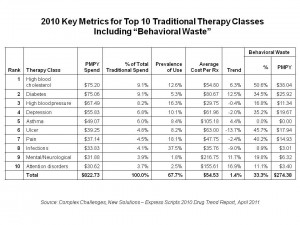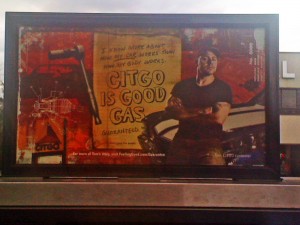 The environmental landscape for pharmaceutical manufacturers and retail pharmacies is marked with landmines, yield signs, and cautionary wild cards: health reform, supply chain dynamics, specialty drug pricing, pharmacogenomics, and the high burden of chronic disease among them.
The environmental landscape for pharmaceutical manufacturers and retail pharmacies is marked with landmines, yield signs, and cautionary wild cards: health reform, supply chain dynamics, specialty drug pricing, pharmacogenomics, and the high burden of chronic disease among them.
But the crux of the challenge for achieving optimal outcomes has less to do with these factors than it does with consumer behavior: specifically, the chasm between what people/health consumers say they want versus what people actually do. Express Scripts calls this “The Intent-Behavior Gap,” and it’s the theme of the company’s 2010 Drug Trend Report, Complex Challenges, New Solutions.
The cost of sub-optimal pharmacy behaviors are huge: in 2010, pharmacy-related waste was more than $403 billion. Express Scripts forecasts that pharmacy-related waste will exceed $1.2 trillion between 2010 and 2014, equal to $3,722 per capita in the U.S. This is ‘waste’ because that spending doesn’t result in any marginal health benefit for each U.S. health citizen. Overall, $1 in every $3 of traditional pharmacy spend is waste.
Express Scripts asserts that, “Consumer behavior stands between the doctor and optimal outcomes.” Regardless of health providers’ appropriate prescriptions for their patients, there are three opportunities for re-shaping consumer behavior that achieves optimal outcomes and reduces pharmacy-related waste:
- Optimizing the sales/retail channel, equivalent to $88 billion of waste.
- Optimizing drug mix, equal to $57 billion of wasteful health spending.
- Maximizing adherence, an opportunity of $258 billion.
The chart above identifies the key metrics for the top 10 prescribed therapy class of drugs in 2010, showing the percentage of “behavioral waste.” The top categories in waste were Rx drugs for treating cholesterol, ulcers, pain, depression and diabetes.
 Health Populi’s Hot Points: Express Scripts asked Harris Interactive to poll U.S. health consumers about their use of and interest in pharmacies and personal health behaviors. 71% of retail pharmacy consumers said they’d use home delivery of Rx drugs instead of a “bricks” retail pharmacy. 82% of people said they’d switch to generic drugs instead of brands. And, 58% of patients who are non-adherent with prescribed drug regimens think they’re already taking their meds as prescribed.
Health Populi’s Hot Points: Express Scripts asked Harris Interactive to poll U.S. health consumers about their use of and interest in pharmacies and personal health behaviors. 71% of retail pharmacy consumers said they’d use home delivery of Rx drugs instead of a “bricks” retail pharmacy. 82% of people said they’d switch to generic drugs instead of brands. And, 58% of patients who are non-adherent with prescribed drug regimens think they’re already taking their meds as prescribed.
As I was filling my gas tank yesterday, I noted the sign pictured on the right: an attestation from a consumer saying, “I know more about how my car works than how my body works.” The same can be said, based on the Harris Poll data for Express Scripts, that people know more about regularly changing their car’s oil than they do about sticking to prescription drug instructions given by their doctors and pharmacists.
What to do? Express Scripts’ own prescription for addressing waste is three-fold: switch patients to generics whenever possible, move consumer to buy drugs for home delivery, and get patients to take drugs as prescribed. The third challenge is the heaviest lifting, and requires major and complex behavior change. Health plans have begun to adopt value-based designs that artfully and fiscally nudge patients toward better health behaviors, including medication adherence. The more these plans can influence consumers on a 24×7 basis at peoples’ daily touchpoints — especially utilizing mobile platforms like smartphones and PDAs — the more patients will become more conscious, and conscientious, about their micro-health decisions. Perhaps then, one day, CITGO will be able to revise its Fueling Good campaign slogan.




 Thank you FeedSpot for
Thank you FeedSpot for